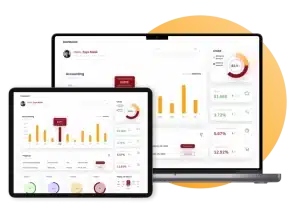Ready ka na ba to transform the way you manage your business finances? Finance ERP systems are more than just a trend; they’re a game-changer for businesses aiming to stay competitive. Imagine seamlessly integrating all your financial operations, enhancing precision, and boosting profitability—all through one powerful tool.
But how exactly can Finance ERP elevate your business to the next level? The intricacies and benefits of these systems might surprise you. Curious? Let’s dive in and unravel the potential of Finance ERP together!
Key Takeaways
|
Table of Contents

What is Finance ERP?

Finance ERP serves as the technological backbone for comprehensive financial management, centralizing all financial data within one unified system. This centralization enhances visibility and control over key financial activities, allowing managers and business owners to view their financial health at any moment.
Moreover, Finance ERP life cycle integration capabilities ensure it works seamlessly with departments like sales, procurement, and human resources. This integration guarantees that all financial data reflects real-time business activities, improving the accuracy of reports and operational efficiency. For instance, when a sale is made, Finance ERP automatically updates inventory and accounting records, streamlining operations and reducing errors.
Core Components of ERP in Finance
Different from a Retail ERP, a closer examination of Finance ERP reveals a robust suite of essential components tailored to handle a wide range of financial tasks efficiently. Each component is designed to streamline specific aspects of financial management, ensuring comprehensive coverage and enhanced operational control. Here are the five core components:
- General Ledger: Acts as the central hub for all accounting data, ensuring consistency and accuracy across financial statements.
- Accounts Payable and Accounts Receivable: Manages all outgoing and incoming payments, crucial for maintaining effective cash flow and optimizing revenue streams.
- Asset and Cash Management: Tracks and manages company assets from acquisition through depreciation, and provides strategies for managing liquidity.
- Financial Reporting and Profit-Tracking: Generates detailed financial reports for internal and external use and analyzes profit margins across different business units or product lines.
- Multi-Currency and Banking Management: Supports transactions in multiple currencies and integrates with banking systems to streamline financial oversight and transactions.
These components are interconnected, ensuring that updates in one module are automatically reflected across others, enhancing the reliability of financial data. For example, changes in asset management can affect calculations in the general ledger and financial reporting, ensuring real-time accuracy and compliance. This integration allows Finance ERP to provide a comprehensive toolkit for businesses to maintain a competitive edge, offering strategic insights into financial health and operational efficiency.
Importance of Finance ERP
Integrating Finance ERP into your business processes can lead to comprehensive financial management. By centralizing all financial data within a single platform. This centralization enables real-time insights into your financial landscape, speeding up decision-making processes.
The streamlined flow of information reduces errors and ensures data consistency, which is crucial for maintaining compliance with financial regulations. Moreover, implementing Finance ERP aligns financial management with your corporate strategy, ensuring every decision supports broader business objectives.
This alignment is vital in dynamic markets like the Philippines, where businesses must adapt quickly to stay competitive. By enhancing compliance and offering tools for detailed financial analysis, finance reporting software helps businesses navigate regulatory landscapes and achieve strategic goals, leading to improved efficiency and growth opportunities.
Benefits of Finance ERP

The advantages of employing Finance ERP are considerable, offering a blend of enhanced capabilities across various aspects of business management. Here are the key benefits:
- Enhanced Financial Reporting and Analytics: Provides deeper insights into business performance, driving strategic decisions with accurate, real-time data.
- Compliance and Audit Readiness: Improves adherence to regulations with standardized processes that meet both local and international standards, ensuring audit processes are streamlined and more manageable.
- Efficient Resource Allocation and Cost Management: Facilitates optimal use of resources and controls costs effectively, which is crucial for maximizing profitability and operational efficiency.
- Accelerated Financial Close Cycles: Enables quicker closing of financial books, allowing for faster and more frequent financial reporting.
- Strategic Financial Planning: Supports detailed forecasting and scenario planning to manage cash flows and predict future financial outcomes effectively.
These benefits demonstrate how Finance ERP can transform financial management, providing organizations with the tools they need to optimize performance and sustain competitive advantages in their respective markets.
Implementing Finance ERP in Your Business
The implementation of Finance ERP requires thorough planning and evaluation to ensure it aligns with your business needs. Start by assessing your current financial operations to identify areas needing enhancement or overhaul.
This evaluation is crucial for selecting a Finance ERP system that fits your specific requirements and goals, ensuring seamless integration and scalability to grow with your business. Once you’ve selected the appropriate Finance ERP system, focus on its integration and deployment.
Manage this phase meticulously to minimize disruptions, configuring the system to match financial workflows and conducting extensive testing before going live. Post-implementation, ensure comprehensive training for all relevant staff to maximize the system’s potential, with ongoing support and updates to accommodate upgrades or improve user efficiency.
Finance ERP vs. Dedicated Accounting Software
While dedicated accounting software handles basic financial tasks, Finance ERP offers a more integrated and comprehensive solution. Unlike standalone software, Finance ERP unifies financial management across all business functions, ensuring consistency and accuracy. This integration is crucial for growing businesses or those managing multiple departments.
Finance ERP’s all-encompassing nature particularly benefits complex organizations with diverse operational needs. By consolidating financial processes into a single platform, Finance ERP not only eliminates data silos but also improves financial oversight. As a result, this integration streamlines operations reduces redundancies, and provides a cohesive understanding of financial status, which is essential for informed strategic decisions in dynamic business environments.
HashMicro’s ERP for Financial Success

HashMicro’s ERP software stands out as a premier solution for businesses aiming to enhance their financial operations and achieve sustainable success. By integrating advanced functionalities specifically tailored for comprehensive financial management, HashMicro’s ERP system ensures robust, scalable solutions that adapt seamlessly to the dynamic needs of modern businesses.
Here’s how HashMicro addresses key financial challenges:
- Centralized Financial Data: HashMicro’s ERP consolidates all financial information into one centralized system, promoting enhanced visibility and real-time financial insights.
- Automated Financial Processes: From invoicing to asset management, automation reduces manual errors and saves time.
- Comprehensive Compliance Tools: Designed to meet local and international standards, helping businesses stay compliant with regulatory changes effortlessly.
- Advanced Analytics and Reporting: Offers deep insights and customizable reports that aid in strategic planning and decision-making.
- Multi-Currency and Multi-Regional Capabilities: Facilitates global business operations, managing various currencies and tax regulations across different regions.
These features represent a strategic framework designed to streamline financial operations and enhance decision-making accuracy. While many software providers offer ERP solutions, HashMicro’s best ERP system Philippines stands out as the most comprehensive. HashMicro’s ERP solution integrates a wide range of financial management tools seamlessly, providing unparalleled support for operational efficiency.





































